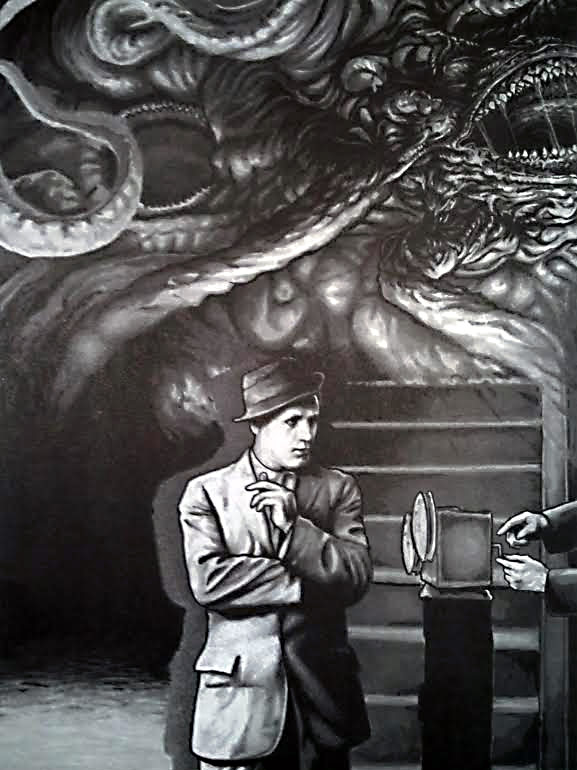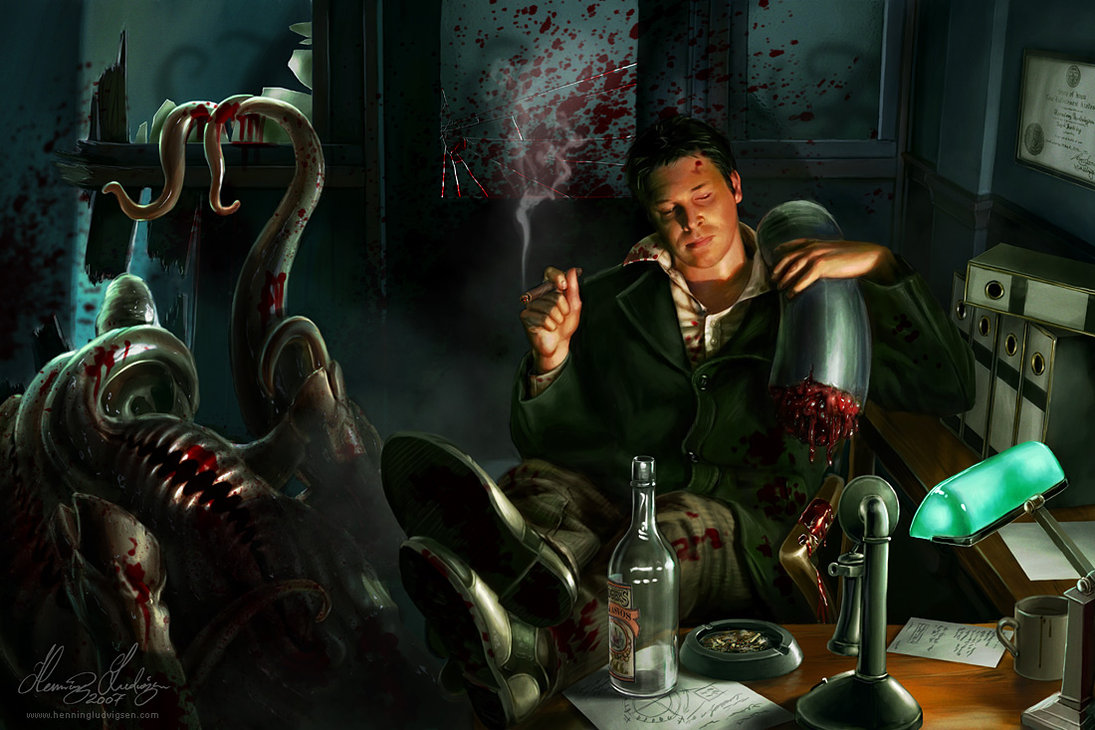 The Boston side quest continues! After learning about a meeting between two cultists, the investigators realize they have a chance to kill an old foe. In order to stop him, they’ll have to case his hideout, figure out a plan of attack, and execute it without incident. Of course, no plan survives initial contact with reality. What tricks does their foe have up his sleeve? Hint: sometimes you don’t see the forest for the giant monster pretending to be a tree.
The Boston side quest continues! After learning about a meeting between two cultists, the investigators realize they have a chance to kill an old foe. In order to stop him, they’ll have to case his hideout, figure out a plan of attack, and execute it without incident. Of course, no plan survives initial contact with reality. What tricks does their foe have up his sleeve? Hint: sometimes you don’t see the forest for the giant monster pretending to be a tree.
Podcast: Play in new window | Download (Duration: 2:30:20 — 69.0MB)
Subscribe: RSS






great god pan-o-vision, omg
well, if we weren’t sure that this was pulp already, it’s def pulp now. I do like the One Ring angle of the PCs’ Mythos superweapon, though, and do hope that you make them regret doing the right thing later in the campaign, Ross.
Just a quick comment regarding the first scene: it seemed like Ross was being a bit too helpful in telling the PCs how to structure their plan to maximize their chances for success, basically telling them that the more people who left, the higher their chances, and seemingly giving them more ideas about the monster’s likely behavior then their characters ought to have had.
I don’t really mean to make this a criticism of Ross, though; for one thing, I know that sometimes you’ve got to encourage the PCs to move along, and helping them structure their plan helps do that. But what I really wonder about, is whether this is something that the GUMSHOE system encourages. I can see how the mechanic of automatic successes on spends could make it very difficult to tell players that they can’t know something, or can’t make informed decisions to enhance their chances of success.
So what should a GM do in a GUMSHOE scene in which there aren’t really any helpful investigative spends available because vital information is simply unknowable? Or when PCs attempt actions that can’t really be improved with general ability spends? Hmm…maybe I should Ask Ken and Robin…
By this point, all of the PCs had Cthulhu Mythos and had already dealt with supernatural monsters. I also didn’t want to repeat earlier sessions where the players dithered over planning too long. It was a relatively simple challenge to avoid one monster, anyway (It just a byakhee). For those reasons, I outlined their options pretty openly.
The key to gumshoe is how players use the information that the game gives them. In multiple places, the players misinterpreted the significance of certain clues and I did not correct them.
GMs can simply disallow useless spends. I’m not sure what else you’re getting at because if a PC tries to do something impossible, regardless of system, the GM should let them know before they waste everyone’s times. Do you have examples of what you’re concerned about?
That’s a fair point about their Cthulhu Mythos knowledge. And I’m 100% with you on the need to cut out the dithering and press them to go on. Like I said, I don’t think I’m really criticizing your approach here, but it did make me think.
I’m planning on running some Trail here soon, to see if it’s a good fit for my Civil War scenarios. And so I’m paying attention to how the system shapes player behavior and GM behavior. The point-spend system is specifically intended to prevent failures of information gathering. But like all game systems, it also has its own failure mode. In Gumshoe’s case, I think the tendency is to fail in the other direction: the danger is toward giving the PCs too much control over the outcome of situations, both investigative and practical. This is both because of the automatic successes in investigation spends, and because general ability spends affect d6 rolls so strongly. With the right pools available, a PC can virtually guarantee themselves against failure in a specific moment. For example, with a few points spent in Athletics, a PC can guarantee that they won’t die from a dangerous jump across a chasm.
Of course, that momentary control comes at a cost of long-term control as pools get emptied; so the other main failure mode would be giving PCs too much opportunity to recover their pools over the course of a plot, so as to make that long-term consequence stop mattering. It’s basically the same problem as the ol’ 15-minute adventuring day in D&D.
Since I’m hoping to write for publication, I’m trying to work out what type of story structures best avoid these failure modes. Maybe a scenario can’t open with a huge bang of danger that threatens the PCs’ lives, because they’ll just spend their way out of it. Additionally, there is going to be a limit to the number of tests that a scenario can include without building in at least a little rest, or the PCs will simply get mathematically ground down.
Plus, when I’m GMing, I’m going to have to work out when to suggest particular spends, what level of spends to require, and whether to tell the players how hard the tests are going to be before they roll.
Gumshoe can be fantastic when it works. It was amazing for The Fall Without End, as we constantly worried about our climbing rolls and agonized during our single refreshment opportunity. I’m looking forward to working these things out for my scenarios, and I’m glad I have the chance to cheat off you. 🙂
In gumshoe, a lot of tension comes from the decision to spend points, which helps preserve the atmosphere in a horror game. For many general ability tests, I never reveal the target number, especially for difficult tests. PCs also have to declare their spends before rolling. Plus there are automatic spends/costs, like sanity from using Cthulhu Mythos.
There’s also the core dilemma of interpreting clues correctly. No point spend can guarantee success. You have to deduce certain things sooner or later.
In my experience, players tend to use a lot of their points for set ups and initial plans. PCs never have enough points to coast through an entire adventure. Sooner or later, the PCs are worn down and have to make straight d6 rolls because their characters have nothing left. I prefer this to Call of Cthulhu, where player plans tend to fuck up before they get a chance to even get started. “Well, I have a great idea that could work but I failed my skill check so we just have to kick in the door.” happens ways too much in CoC.
Read some published Trail adventures or invasive procedures (fear itself) for ideas on good point spends and so forth.
In other words, players can make sure their cool plans start out right, but as things progress, things spiral more and more out of control.
I did think it was a little funny that the horror from beyond spacetime was capable of conceptualizing a tunnel as a thing with a beginning and end even though it didn’t seem to have any sort of extrasensory awareness, but then I’m always all for playing up the “we are as horrific to them as they are to us” angle. which, apropos of nothing, was the subject of a short story by Peter Watts called The Things, which tells Carpenter’s The Thing from the Thing’s perspective. it’s glorious and is available free online, for anyone who’s into humans being the real monsters.
The bit at the end about dangling threads makes me wonder what happened to that super-assassin from tier one of Heroes of New Arcadia. You know, the guy that the Syndicate brought back from the dead, who surrendered to the heroes at the water plant on the condition that they find a way to give him back his good looks?
The last time he was mentioned, they were paying for him to stay at a hotel for a couple days while they figured out what to do with him. Ross said that they had to do something eventually or he would jut walk away and go back to a life of crime.
And he never showed up again.
I think “Great God Pan-o-vision” is Bill’s greatest pun that I’ve heard. Bravo.
Really liked this one and how Ross kept it challenging despite the clever use of the mythos camera.
I’m also enjoying how Bill’s character is basically one of the characters in a Lovecraft story who read the Necronomicon back in undergrad. The downside of that was the huge (and thematically appropriate) “oh shit” stability hit for the Dark Young rampaging.
I’m catching up on this campaign during spring 2020, while there are many stay in place orders going due to the 2019 coronavirus. While I always appreciate it, I especially enjoy the podcast right now – it provides the vicarious sense of playing around an actual table right now.